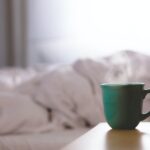 There are a lot of factors to play when it comes to a good nights kip. A lot of people suffer from insomnia & lack of sleep, which can often manifest further into lack of energy, low mood, poor concentration….and the list goes on. Research has also shown that lack of sleep may cause you to overeat the next day, specifically craving sugary and processed foods.
There are a lot of factors to play when it comes to a good nights kip. A lot of people suffer from insomnia & lack of sleep, which can often manifest further into lack of energy, low mood, poor concentration….and the list goes on. Research has also shown that lack of sleep may cause you to overeat the next day, specifically craving sugary and processed foods.
Eating foods that contain the key vitamins & minerals to support your nervous system can have a profound effect on your sleep.
One of the most important things to consider is your blood sugar balance. When we eat sugary and highly processed foods, this can cause a spike in blood sugar which can affect the levels of insulin & our stress hormone cortisol, and in turn how well we sleep.
When we get a blood sugar spike, this can often be followed by a dip which can actually wake us up through the night. So it’s best to opt for whole grains over refined foods, complex over simple carbohydrates, and to reduce your sugar intake.
Here are some other foods you should focus on to improve your sleep routine:
- Omega 3 essential fatty acids – higher levels of Omega 3 in your diet can lead to better sleep, and a higher ratio of 3:6 can also aid sleep. Research may also suggest it may stimulate melatonin levels, the hormone that regulates sleep. You can find Omega 3 in oily fish, chia seeds, flax seeds & walnuts.
- Magnesium – magnesium is crucial for good quality sleep, it relaxes your muscles and can decrease your anxiety levels. Magnesium rich foods include nuts (particularly almonds & walnuts) & seeds, dark leafy greens (spinach, chard, lettuce) and cacoa (raw chocolate) too.
- Fibre – fibre can lead to a more deep and restorative sleep so opt for getting your recommended 35g of fibre per day – choosing fruits, vegetables & wholegrain foods will help to increase your daily intake. Foods such as porridge oats, raspberries, strawberries, oranges, brown rice, sweet potato, kidney beans, apples & pears.
- Tryptophan – tryptophan is an amino acid that promotes sleep. It is a precursor to serotonin and melatonin which aid sleep. The best tryptophan rich foods include turkey, chicken, meat, eggs & fish.
- Melatonin rich foods – melatonin can also be found in some foods so by increasing our consumption of these foods, we can increase our body’s melatonin levels. The top melatonin rich foods include cherries, bananas, oats, tomatoes & pineapple.
- Serotonin rich foods – the same goes for serotonin and increasing our levels through foods – the best sources being kiwifruit, potatoes, pork, chicken, kidney beans, bananas, eggs, mushrooms, & oats.
- Vitamin B12 – Vitamin B12 is essential for energy during the day & proper nerve function, so low levels can impact our sleep routine. Eggs are a great source, as well as most meats and dairy products.
- L-theanine – L-theanine is an amino acid that helps to promote relaxation. It’s mostly found in teas so drinking teas such as chamomile, Tulsi & Lemon balm can help too.
There are other things apart from food that are equally as important to aiding your sleep routine such as:
- Finish eating a couple of hours before bedtime – our digestion slows down at night so eating a big meal just before we go to bed can make you feel uncomfortable and hinder you getting to sleep
- Trying some essential oils like Lavender, Chamomile or Marjoram
- Taking an Epsom salt bath – Epsom salts are filled with magnesium so it’s a great, relaxing way to absorb magnesium transdermally (through the skin)
- Switching off digital devices one hour before bed – lots of research can be found on the effects of blue light from these screens and how they can interfere with your natural sleep cycles
- Trying out some restorative and relaxing exercise such as yoga – yoga can help us to unwind and relax, and prepare our bodies for a deep sleep.
There are also things to avoid to improve sleep quality:
- Highly processed & sugary foods – which can spike your blood sugar levels
- Alcohol – it is said to decrease our levels of REM sleep
- Caffeine & caffeinated energy drinks – caffeine has a huge disruptive effect on our sleep….there is a link between caffeine consumption, reduced sleep quality & even increased daytime sleepiness levels.
